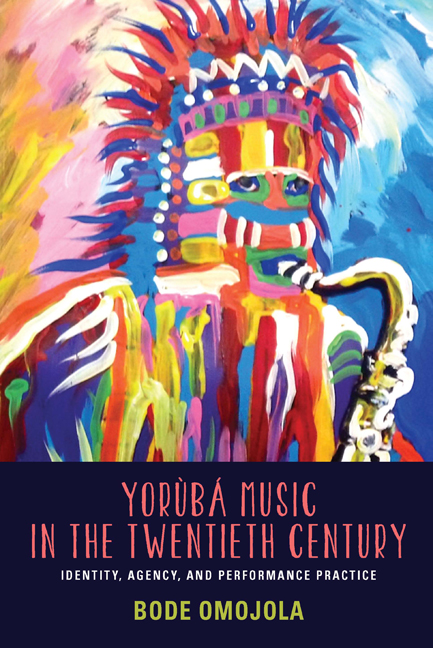Book contents
- Frontmatter
- Dedication
- Contents
- Acknowledgments
- Introduction
- 1 Yorùbá Drumming: Performance Practice and the Politics of Identity
- 2 Talking and Stammering: Toward an Analysis of Yorùbá Drumming
- 3 Songs of the King’s Wives: Gendered and Social Identities in Yorùbá Vocal Performance
- 4 The Aírégbé Song Tradition of Yorùbá Female Chiefs
- 5 Yorùbá Music in the Christian Liturgy: Notation, Performance, and Identity
- 6 Yorùbá Music in Christian Worship: The Aládǔrà Church
- 7 Yorùbá Popular Music: Hybridity, Identity, and Power
- 8 Yorùbá Islamic Popular Music
- Conclusion
- Appendixes
- Notes
- Selected Discography and Videography
- Bibliography
- Index
5 - Yorùbá Music in the Christian Liturgy: Notation, Performance, and Identity
Published online by Cambridge University Press: 11 January 2024
- Frontmatter
- Dedication
- Contents
- Acknowledgments
- Introduction
- 1 Yorùbá Drumming: Performance Practice and the Politics of Identity
- 2 Talking and Stammering: Toward an Analysis of Yorùbá Drumming
- 3 Songs of the King’s Wives: Gendered and Social Identities in Yorùbá Vocal Performance
- 4 The Aírégbé Song Tradition of Yorùbá Female Chiefs
- 5 Yorùbá Music in the Christian Liturgy: Notation, Performance, and Identity
- 6 Yorùbá Music in Christian Worship: The Aládǔrà Church
- 7 Yorùbá Popular Music: Hybridity, Identity, and Power
- 8 Yorùbá Islamic Popular Music
- Conclusion
- Appendixes
- Notes
- Selected Discography and Videography
- Bibliography
- Index
Summary
“Firstly, strict adherence to the characteristics of Yorùbá music … ; and secondly, study of the methods of development of European music of a certain type and adaptation of them to our need.”
—Phillips, Yoruba Music, 17Composing for a New Religion
This chapter focuses on Yorùbá church music, a relatively new musical genre whose origins date back mainly to the early decades of the twentieth century. Yorùbá church music departs from indigenous, precolonial Yorùbá musical practices in two important ways. First, the music is integral to the liturgy of a new religion; and second, it is often written down in staff notation or in solfège, thus departing from the oral tradition of indigenous music. As the first Westerninfluenced musical tradition in Yorùbáland, it provides the major plank for the development of new musical genres and practices. The integration of Yorùbá music into Christian worship presents interesting perspectives about the process and manner of identity construction through musical expression during the colonial era. That process depended largely on the activities of a few Westerneducated Yorùbá Christians who were motivated by the need to create a new style of Christian music that, unlike the imported European type, was suited to the tastes and cultural background of Yorùbá worshippers. The resultant musical compositions, which reflected the elitist background of the musicians who pioneered the new tradition, were culturally marginal to traditional Yorùbá musical practices and were alien to the average Yorùbá person. It must be noted that many of the early Christian churches were located in the òyó region and in the adjoining areas of Abéòkúta, Lagos, and Badagry. Thus the Christian music reflects a strong influence of the òyó-Yorùbá culture, notably in its exclusive use of the òyó dialect. Even more notable is the fact that the Right Reverend Samuel Ajayi Crowther, the first African bishop and the man who translated the Bible from English into Yorùbá, hailed from the town of Òsoògùn, near òyó.
- Type
- Chapter
- Information
- Yorùbá Music in the Twentieth CenturyIdentity, Agency, and Performance Practice, pp. 113 - 135Publisher: Boydell & BrewerPrint publication year: 2014



